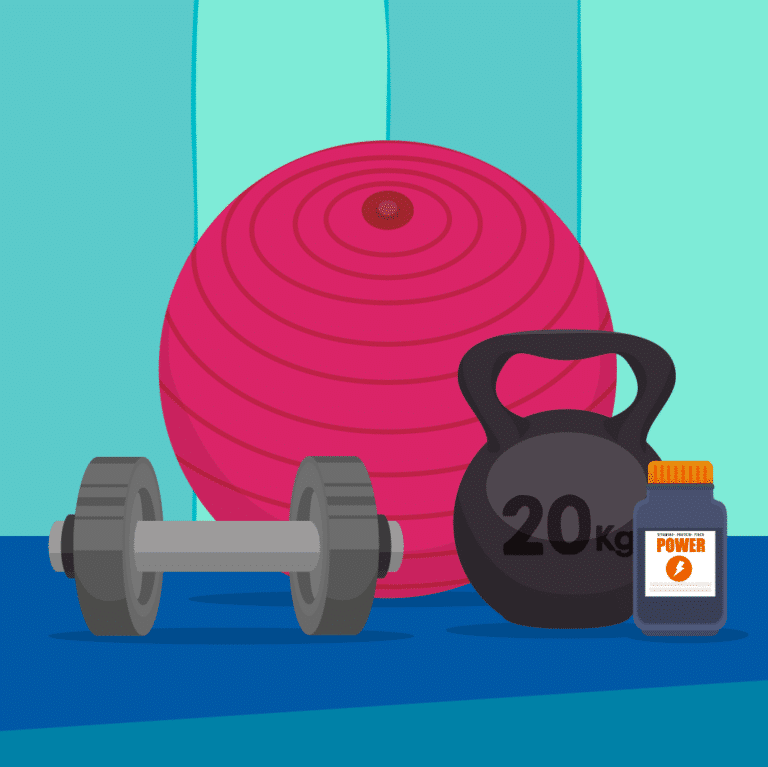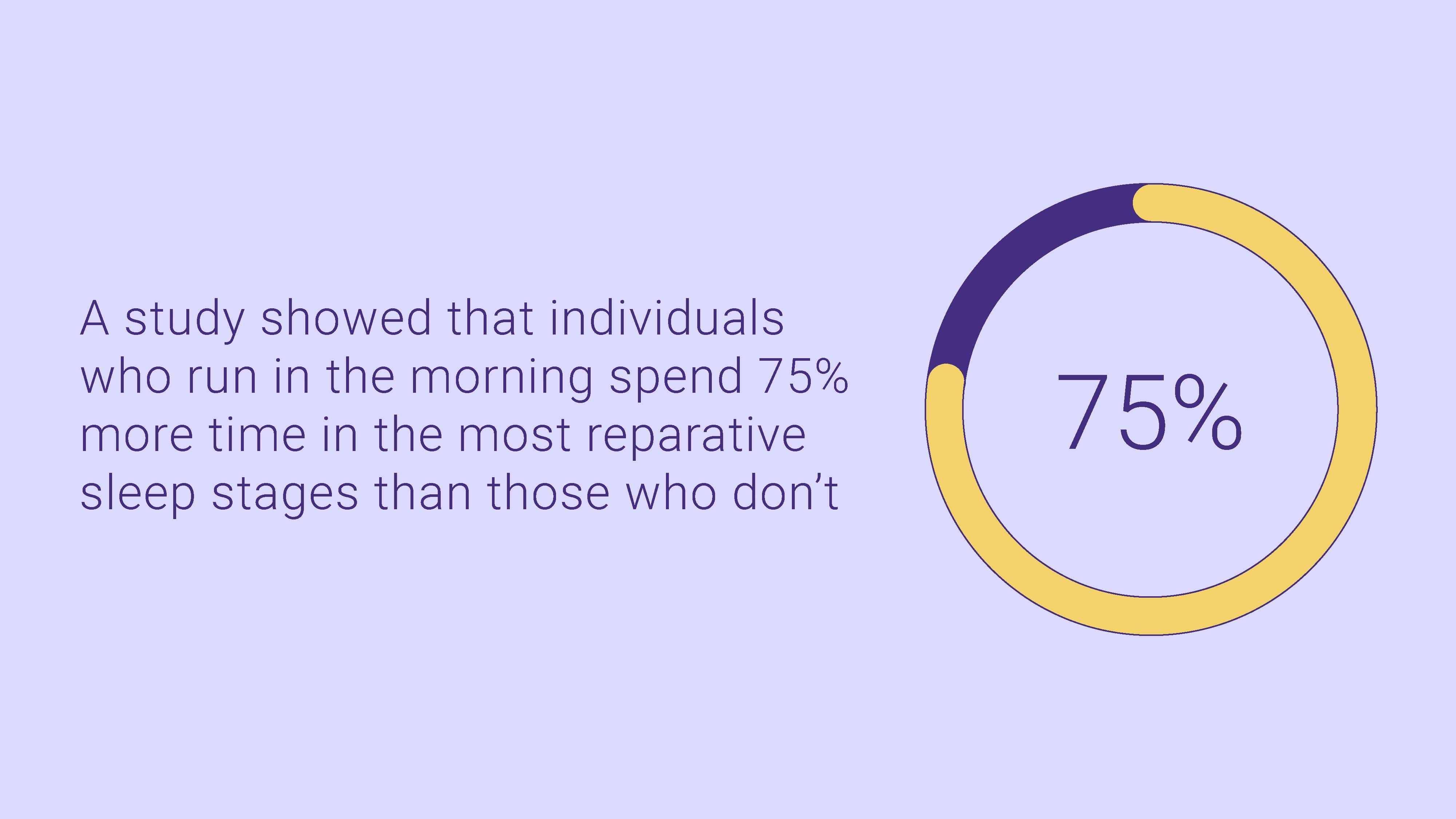How Does Exercise Affect Sleep?
Michele Roberge, RPSGT, R.T.
Michele Roberge is a Registered Polysomnographic Technologist and a Registered Radiologic Technologist. She also serves on the board for the Florida Association of Sleep Technologists (FAST).
- Exercise has well-documented benefits for sleep quality, promoting deep, restorative sleep and reducing stress and anxiety, ultimately leading to a more restful night’s sleep.
- Optimal exercise timing, such as morning workouts to regulate circadian rhythms and exercise 5-6 hours before bedtime to aid in the initiation of the body’s sleep process, is crucial for maintaining a healthy sleep-wake cycle, while avoiding intense exercise immediately before bedtime.
- A balanced exercise routine involving morning cardio for longer deep sleep periods, strength training for overall fatigue, and pre-bedtime stretching to promote relaxation and activate the parasympathetic nervous system can contribute to a balanced circadian rhythm and improved overall well-being.
Sleep specialists and doctors agree that both exercise and quality sleep is necessary to live a healthy, happy life. The American Heart Association states the average adult should exercise 30 minutes a day, 5 days a week.1 Sleep specialists recommend adults get near 7 to 9 hours of sleep every night.
With a busy schedule, it may seem impossible to get all of the rest and exercise our bodies need. In this guide, we’ll discuss how to juggle exercise and sleep to make sure you’re getting enough of each and living a healthy life.
How Exercise Affects Sleep
When done right, exercise can help you fall asleep faster and stay asleep longer. Many factors influence the impact exercise will have on your quality of sleep. These include the length of time between your workout and bedtime, food and drink consumed during the day, your fitness level, and the duration of your exercise.
Both aerobic and anaerobic exercise is excellent for your body, it lowers cortisol levels, boosts human growth hormone, and lowers your blood pressure. Training increases your quality of sleep by fostering deep, restorative sleep. Deep sleep boosts your immune system and cardiac health and reduces stress and anxiety. In addition to promoting restorative sleep, exercising can increase the duration of your sleep.
Exercising outdoors is even better for you because it allows your body to get natural sunlight, and this reinforces your sleep-wake cycle. Whether it’s indoors or outside, physical activity causes you to expel energy, which causes you to be more tired by the time bedtime rolls around.
In the long run, regular vigorous exercise can decrease your chance of developing certain mood disorders and sleep disorders, such as insomnia, sleep apnea, and periodic limb movement disorder (PLMD). As the Cleveland Clinic Guide to Sleep Disorders notes, PLMD is a sleep disorder that presents as rhythmic movement of the legs, and approximately 80% of patients with restless leg syndrome also have periodic limb movement disorder.
A recent study found adults who exercise at least 150 minutes per week are less drowsy throughout the day and report having a 65% improvement in their quality of sleep at night.2

Best Times to Exercise
Now that we’ve covered how exercise can bolster your quality of sleep, it’s time to discuss the best times to work out, so you aren’t wired when it comes time to go to bed.
Though it’s not the only time to exercise for better sleep, working out in the morning is a great way to improve your sleep at night and boost your energy during the day. Getting exposure to natural sunlight in the morning helps reinforce your circadian rhythm, otherwise known as your sleep-wake cycle. To understand how your circadian rhythm works, it’s important to understand the science behind sleeping and waking. When sunlight enters your eyes, it signals your brain to stop producing melatonin, a hormone in your body that promotes sleep. The halt in melatonin production wakes you up. When your body senses a lack of sunlight, during the evening hours, it’ll prompt itself to start producing melatonin again. Reinforcing this sleep-wake cycle every morning by getting exposure to sunlight helps your body fall into a steady rhythm of waking up and going to sleep at the same time every day. Additionally, the morning sun helps ready your brain for the day ahead.
Suffering from back pain problems? Read our guide on finding the best mattress for back pain sufferers.
Exercising prompts the production of hormones such as adrenaline, endorphins, and dopamine. In the mornings, your body already naturally produces these hormones, so exercise just adds to the process. These hormones wake you up, boost your mood, and sharpen your mental processes. Starting your day with an early-morning workout is a sure way to kick the day off on a good note.3
If exercising in the morning isn’t your thing, we recommend working out 5 or 6 hours before you plan on going to bed. The reason is that when you exercise, your body temperature rises and stays at increased levels for around four hours after your workout ends. After four hours, your body temperature begins to drop to normal levels. During the process of falling asleep, your body temperature drops 1 or 2 degrees from normal. The initial drop in temperature as a result of your workout helps initiate the drop in temperature to help you fall asleep; this means working out in the afternoon around 5 or 6 hours before bed can help you fall asleep faster.4 Additionally, exercising in the hours before bed helps suppress your appetite, preventing you from overeating in the evenings. Eating a big meal before bed can cause interrupted sleep, or make it difficult for you to fall asleep. If you do find you’re always eating dinner late, we recommend eating the best foods for sleep as to not hinder your sleep quality.
Doctors and sleep specialists alike recommend finding 30 minutes in your day to get active. Even if it must be done in the evening, exercising at any time is better for your quality of sleep and body than skipping it entirely. Granted, vigorous exercise causes your heart rate, blood pressure, and body temperature to increase— taking this into consideration, a strenuous workout right before you plan to plop down into bed is not the best idea. 5
The Best Exercises to Promote Sleep
Cardio, strength training and stretches are all great exercises to boost your quality of sleep. Cardio is great for helping you get more deep sleep, while deep breathing is great at relaxing you before it’s time to fall asleep.
When it comes to cardio, it’s best done in the morning. A morning run can effectively lower your blood pressure and induce longer sleep cycles during the night. A recent study showed that individuals who run in the mornings spend 75% more time in the most reparative sleep stages than those who exercise later in the day.6
When it comes to strength training, lifting weights does help you sleep better, but the effect strength training will have on your sleep depends on when you choose to workout. Lifting weights in the morning causes you to expel a good bit of energy first thing in the morning, and this can cause you to get tired earlier in the evening and thus fall asleep sooner. If you choose to lift weights in the evening, it can help you stay asleep throughout the night, resulting in an overall better night’s rest. Regardless of the time of day, strength training is a sure-fire way to tire your body and muscles out and prepare you for a good night’s rest.
Stretching before bed can help activate your parasympathetic nervous system. Opposite of your sympathetic nervous system which actives your “fight or flight” functions, your parasympathetic nervous system is responsible for your “rest and digest” functions. Stretching also puts your body into a relaxed state, helping your body relax and unwind for bedtime.

Overview of Exercise and Sleep
Incorporating 30 minutes of activity into your daily routine can improve your overall health in a variety of ways. If you want to exercise to improve your sleep, we recommend sticking to the same schedule. Your body naturally wants to sleep and wake at the same time every day. With that being said, it also wants to work out at the same time every day. Keeping a regular schedule helps keep your circadian rhythm in balance, which also keeps your body processes in balance. Being healthy, active, and well-rested calls for improved moods and less stress.
We recommend regularly practicing good sleep hygiene and keeping a sleep journal to document your exercise and sleep-wake cycles daily. Doing this can help you keep track of how much sleep you’re getting and how your rest is improving.
